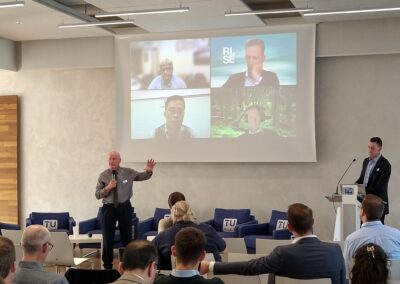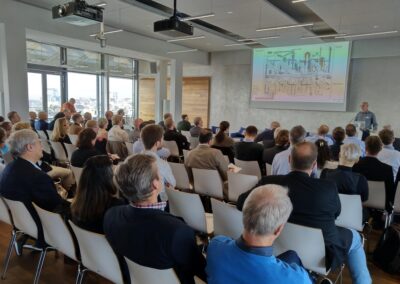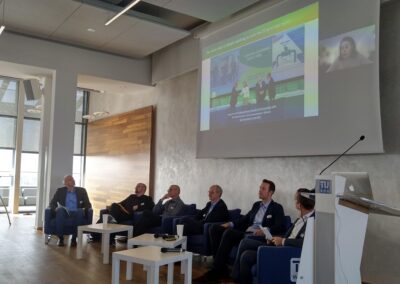WS28: Technology advances in liquid biofuels and renewable gas
Vienna, 17 October 2022 – Workshop organized by IEA Bioenergy in collaboration with the Austrian Federal Ministry for Climate Action, Environment, Energy, Mobility, Innovation and Technology (BMK) and BEST – Bioenergy and Sustainable Technologies GmbH
Summary report: ExCo90 Workshop – Summary Report
Short bios of the moderators and speakers
Background
Both the accelerating climate change as well as the energy crisis related to the war in Ukraine, call for urgent action to move away from fossil fuels such as oil and gas. Energy savings and renewable energy are the key tools to achieve that. Renewable transport fuels and renewable gases will need to have an increasing role in the transport system and the gas distribution system. A strong growth in so-called ‘advanced technologies’ will be required, starting from a variety of feedstocks, particularly underutilised heterogeneous biomass resources. Meanwhile, increasing prices for oil and gas have totally changed the picture and prospects of renewable fuels compared to one or two years ago.
The workshop explored advances being made in new biofuels technologies, as well as technologies to produce renewable gas (biomass based), and discussed what is needed to accelerate their roll out to the market. It contained three parts: the first session considered advances in renewable gas / biomethane, the second advances in liquid biofuels, and the third session showed concrete developments in Austria.
Key conclusions
Both climate change and energy security are major reasons to urgently move away from fossil fuels such as oil and gas. This requires a combination of energy conservation, energy efficiency, electrification and shifting applications to renewable fuels – there is no silver bullet.
Renewable liquid transport fuels will need to have an increasing role in the transport system and the role of renewable gases will need to increase in the gas distribution system. In both cases bioenergy plays a vital role. The current push on biomethane at (European) policy level also helps further developments.
Renewable gas:
Biomethane can be used without changing (natural) gas transmission/distribution infrastructure or end user equipment, so it provides a renewable solution that is immediately applicable.
Biogas sectors are starting to focus more on upgrading to biomethane which can be fed into the gas grid or used decentral as natural gas substitute. The upgrading also facilitates capture and use of biogenic CO2 from the biogas.
Gasification pathways are also promising to deliver biomethane (SNG) which can be fed into the grid to replace fossil gas. Technologies have been proven and are ready to take the next step to commercial scale projects.
Accelerating the deployment of renewable gas requires solid planning and strategies, a stable and supportive policy framework, the removal of unnecessary barriers, easy market access, the possibility to trade products cross border, the unlocking of sustainable feedstocks and the recognition of the multifunctionality of biogas/biomethane systems.
Advanced liquid biofuels:
Thermochemical and biochemical routes to produce advanced liquid biofuels are entering the market, with new projects coming online and further deployment expected in the coming years. While most current projects and technologies still focus on road biofuels, developments increasingly focus on sustainable aviation fuels.
Policy development is essential for the deployment of biofuels. Financing is the most critical factor, and the largest risk for investors is the political risk of changing policies, considering that investments need to have a 15-to-20-year time perspective.
Different industries that process biomass are turning into biorefineries, creating a variety of products, together contributing to the overall business case, and avoiding wastes in the process. Biofuels/bioenergy are an inherent part of these systems. Circularity of carbon and nutrients is a common goal in all these projects.
Biorefining to multiple products is a central principle in all biobased developments.
Summary report: ExCo90 Workshop – Summary Report
RECORDINGS & PRESENTATIONS
Introduction & keynotes
Recording of Introduction & keynotes
- Paul Bennett, IEA Bioenergy / Scion (New Zealand)
NO SLIDES - Hannes Bauer, Austrian Ministry BMK (Austia)
NO SLIDES - Maria Georgiadou, European Commission, DG Research & Innovation
EU R&I policy for renewable fuels
Technical presentations renewable gas
Recording of Technical presentations Renewable Gas
- Robert Böhm, Hitachi Zosen Inova Schmack (Germany)
Biological methanation / Power to Methane - Philippe Lehmann, CO2 Energie AG (Switzerland)
CO2 seperation from biogas upgrading - Heather Wray, TNO (Netherlands)
Pretreatment of wet and complex biomass - Marion Maheut, ENGIE (France)
Production of SNG from dry biomass and waste pyrogasification - Henrik Thunman, Chalmers University (Sweden)
GoBiGas: An Industry Relevant State-of-The-Art Reference for Advanced Biofuel Production via Gasification
Panel discussion: What is needed to accelerate the deployment of renewable gases
Recording of Panel discussion Renewable Gas
- Günter Pauritsch, Austrian Energy Agency (Austria)
Renewable Gas 2040 – Quantitative estimation of demand and domestic supply - Uwe Fritsche, IINAS (Germany)
Key results of the “Renewable Gas” InterTask Project - Henrik Thunman, Chalmers University (Sweden)
GoBiGas: An Industry Relevant State-of-The-Art Reference for Advanced Biofuel Production via Gasification - Andreas Wolf, Austrian Biomethane Registry (Austria)
Renewable Gas Certificates - Giulia Cancian, European Biogas Association (Belgium)
What is needed to accelerate the deployment of renewable gases?
Technical presentations liquid biofuels
Recording of Technical presentations Liquid Biofuels
- Steve Rogers, Licella (Australia)
Hydro-Thermal Liquefaction (HTL) to produce drop-in biofuels and chemicals - Mathieu Morin, IFP (France)
BioTfuel Technology, transforming lignocellulosic biomass into biofuel via thermochemical conversion - Elyas Moghaddam, Gidara Energy (Netherlands)
HTW®2.0 Gasification: A proven path towards Advanced Biofuels - Ralf Hortsch, Clariant (Germany)
Sunliquid® technology: Low carbon cellulosic ethanol for sustainable mobility - Mallikarjun Navalgund, Praj (India)
Technologies for producing biofuels and chemicals from cellulosic feedstock
Panel discussion: What is needed to accelerate the deployment of advanced biofuels
Recording of Panel discussion Liquid Biofuels
- Tomas Ekbom, Svebio (Sweden)
Biofuels to Decarbonize Transport - Jack Saddler, UBC (Canada)
Progress in Commercialisation of Low Carbon Intensive (CI) Biofuels - Patrik Klintbom, RISE / ETIP Bioenergy (Sweden)
NO SLIDES - Li Fuli, Qingdao Institute of Bioenergy and Bioprocess Technology (China)
Opening statement - Sunil Kumar, Min. Petroleum & Gas (India)
NO SLIDES
Developments in Austria
Recording of Developments in Austria
- Bernhard Drosg, BEST (Austria)
Bio electric Syngas Technology for the Production of Biomass Derived Fuels and Platform Chemicals - Josef Schuberth, Agrana
Circular economy in the biorefinery Pischelsdorf - Petra Wollboldt, AustroCel Hallein
2G BioEthanol by utilization of wood sugars the AustroCel BioRefinery - Andreas Werner / Gabriela Maria Straka, Brau Union Österreich
Gösser – The world’s first largescale green brewery
More information
Luc Pelkmans
Technical Coordinator – IEA Bioenergy
luc.pelkmans@caprea.be






